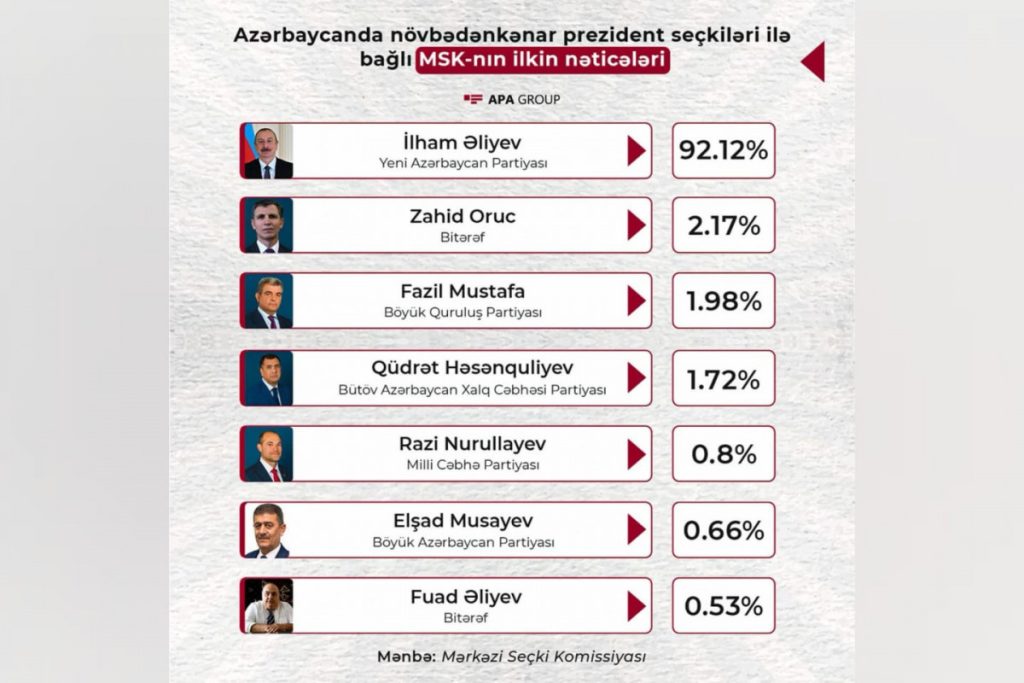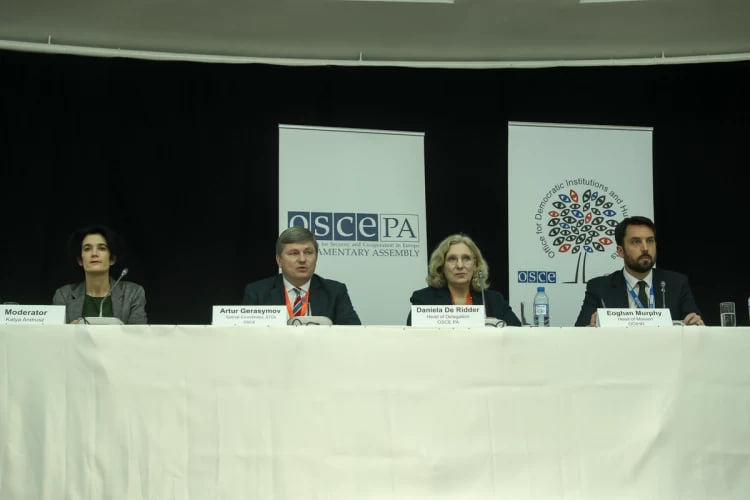Ilham Aliyev won with 92.12 percent of the votes according to the final results
Results of the presidential election in Azerbaijan
The Central Election Commission of Azerbaijan has summarized the results of voting in the extraordinary presidential election held on February 7. The incumbent president, Ilham Aliyev, emerged victorious with 91.12 percent of the vote.
“The early presidential election took place in a restrictive environment, with critical voices and political alternatives largely absent.” This is how OSCE and OSCE/ODIHR observers assessed the election.
Azerbaijan’s non-governmental organization, the Election Monitoring and Democracy Training Center, believes that the early presidential election “witnessed traditional shortcomings in the voting and counting process.”
- Ilham Aliyev is leading with 92.05 percent of the votes
- Ilham Aliyev’s victory formula: fragmented opposition, destroyed media, grateful people
- Early presidential elections are underway in Azerbaijan. Photo
The voter turnout was 76.43 percent
The process of compiling the protocol of district election commissions on voting in the snap presidential election and submitting the first copy of the protocol, along with its attached documents, to the Central Election Commission (CEC) is ongoing.
According to the CEC, changes in voter turnout and votes gained by the presidential candidates were recorded after receiving the incoming protocols.
Based on the first copy of the incoming protocol and its attached documents, which are currently in the districts, the voter turnout is 76.43 percent. However, the votes garnered by the candidates are as follows:

- Ilham Aliyev – 92.12% (4,577,693 votes);
- Zahid Oruj – 2.17% (107,877 votes);
- Fazil Mustafa – 1.98% (98,623 votes);
- Gudrat Hasanguliyev – 1.72% (85,607 votes);
- Razi Nurullayev – 0.80% (39,797 votes);
- Elshad Musayev – 0.66% (32,956 votes);
- Fuad Aliyev – 0.53% (26,561 votes).
“Serious irregularities were observed in the February 7 elections,” stated OSCE and OSCE/ODIHR observers

“The February 7 presidential election marked the first elections held in the internationally recognized territory of Azerbaijan, which resonated with public sentiment. However, there was a notable absence of pluralism in the lead-up to the elections, and critical voices were consistently suppressed. Long-standing restrictions on freedom of association and expression were further reinforced by recent amendments to the legislation, which do not meet international democratic standards,” reads the preliminary conclusion of the OSCE and OSCE/ODIHR Joint Observation Mission on the February 7 presidential election.
The mission found that previous OSCE recommendations regarding the need to amend the country’s Electoral Code had not been accepted.
“The early presidential election took place in a restrictive environment, and while it was effectively prepared, critical voices and a political alternative were largely absent. Unfortunately, previous recommendations to bring the legal framework in line with international standards for democratic elections went unheeded,” stated Artur Gerasimov, Special Coordinator and Head of the OSCE Short-Term Observers.
“At the same time, civil society and opposition representatives noted that the right to freedom of peaceful assembly was restricted in the country,” he said.
“In this important election for the country, no candidate credibly challenged the incumbent, and some opposition parties did not participate at all, claiming a lack of adequate democratic conditions,” said Eoghan Murphy, ODIHR Head of Mission.
“While preparations for the elections were efficient and professional, including the training of polling station commissioners, important safeguards were often overlooked on election day and we observed significant procedural errors throughout the day,” he emphasized.
During the press conference, the Joint Mission reiterated that the composition of the election commissions was not politically balanced, and there were violations of the rights and freedoms of the media, political parties, and civil society. “This does not meet the standards of democratic elections,” Murphy said.
“Claims that the West pressured observers to criticize Azerbaijan are nonsense. All conclusions are objective,” emphasized the mission members, commenting on the allegations by the pro-government press.
The international election observation mission to Azerbaijan’s snap presidential election consisted of 335 observers from 42 countries, including 256 ODIHR experts, long-term and short-term observers, and 79 observers from the OSCE PA.
A local monitoring organization also criticized the election process
A local organization, the Election Monitoring and Democracy Education Center, also released the results of its observation of the snap presidential election.
The Center’s observers recorded minor shortcomings related to the organization of polling stations and preparations for voting on election day. However, they claim that traditional shortcomings were observed in the voting and counting process.
“Such violations include the participation in voting of persons whose names are not included in the voter list, the involvement of citizens in voting in groups, as well as interference by local executive structures in the electoral process.
In some polling stations, cases of multiple voting by one person and violations of the secrecy of the vote were recorded. On election day, pressure on observers and journalists was also recorded at some polling stations. Such pressure arose as a result of non-compliance by members of precinct election commissions with the principles of openness and transparency of voting,” the center said in its assessment.
Observers cooperating with the center note that voter turnout figures at some polling stations differed significantly from the official figures. Such discrepancies lead to allegations that voter turnout at some polling stations was artificially inflated due to cases of multiple voting by one person and mass ballot box stuffing.
“The overall assessment of the pre-election and electoral process conducted by the Center for Election Monitoring and Democracy Education shows that the extraordinary presidential election on February 7, 2024 was accompanied by the absence of a favorable democratic environment and conditions for real political competition, and did not meet the requirements of national legislation and international standards for free and fair elections,” the conclusion reads.


















